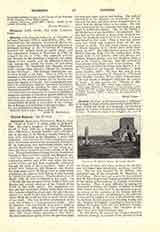

Clogher, Diocese of (Clogherensis), a suffragan of Armagh, Ireland, which comprises the County Monaghan, almost the whole of Fermanagh, the southern portion of Tyrone, and parts of Donegal, Louth, and Cavan. It takes its name from Clogher, the seat of the Prince of Oriel with whose territory the old Diocese of Clogher was, practically speaking, coextensive. The see was founded by St. Patrick, who appointed one of his household, St. Macarten, as first bishop. There does not seem to be any evidence that St. Patrick governed Clogher as a distinct diocese before taking up his residence at Armagh, as is stated by Jocelyn. There is great difficulty in tracing the succession of bishops in Clogher, as indeed in every Irish diocese from the sixth to the eleventh century, on account of the confusion of the bishops with the abbots of the monastic establishments; the difficulty is increased in Clogher in view of the diversity existing between the lists as given in the Irish Annals, and the “Register of Clogher”, compiled by Patrick Culin, Bishop of Clogher (1519-34), and Roderick Cassidy, archdeacon of the diocese. The “Register of Clogher” is of very little historical value.
In 1241 Henry III ordered that Clogher should be united to Armagh, on account of the poverty of both dioceses, but this was not carried out, though under Bishop David O’Brogan large portions of Tyrone were cut off from Clogher and given to Ardstraw (now united with Derry), while the greater part of the present County Louth, including Dundalk, Drogheda, and Ardee, was taken over by Armagh. In 1535 Bishop Odo, or Hugh O’Cervallan, was appointed to the See of Clogher by Paul III, and on the submission of his patron Con O’Neill to Henry VIII, this prelate seems to have accepted the new teaching, and was superseded by Raymond MacMahon, 1546. From his time there are two lines of bishops in Clogher, the Catholic and the Protestant. The apostate Miler Magrath was appointed Protestant bishop by Queen Elizabeth in 1570, but on his promotion to Cashel, resigned Clogher in the same year. Heber or Emer MacMahon (1643-50) took a prominent part in the war of the Irish Confederates, and on the death of Owen Roe O’Neill, was chosen general of the confederate forces. He was defeated at Scariffhollis near Letterkenny, taken prisoner by Coote, and beheaded at Enniskillen. Owing to the persecutions of the Irish Catholics, Clogher was governed by vicars during the periods 1612-43, 1650-71, 1687-1707, 1713-27. The chapter of Clogher was allowed to lapse, but towards the end of the eighteenth century it was reestablished by papal Brief.
A very important provincial synod was held at Clones in 1670 by Oliver Plunkett, Archbishop of Armagh (see Moran, Life of Plunkett). The most remarkable shrines of the diocese are at St. Patrick’s, Lough Derg, near Pettigo, still frequented by thousands of pilgrims from all parts of the world (see Saint Patrick’s Purgatory); Devenish Island in Lough Erne (see McKenna, Devenish, its History and Antiquities, Dublin, 1897); Innismacsaint, also in Lough Erne, where the “Annals of Ulster” were composed; Lisgoole, Clones, and Clogher. The most celebrated works of ancient ecclesiastical art connected with the diocese are the Domnach Airigid, a shrine enclosing a copy of the Gospels, said to have been given by St. Patrick to St. Macarten, and the Cross of Clogher, both of them now in the National Museum in Dublin. The Catholic population of the diocese is 101,162, distributed in forty parishes and ministered to by about 100 priests.
JAMES MACCAFFREY


